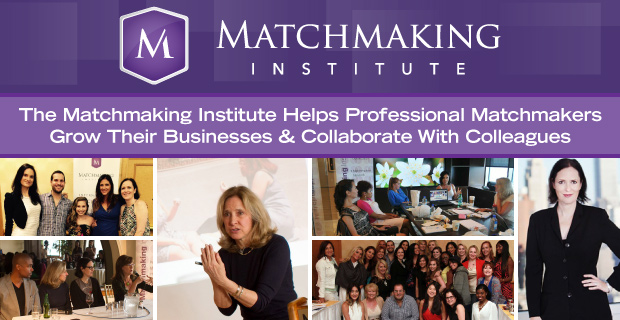An Academy for Would-Be Cupids
ABC 20/20 – Dec. 28, 2004
New York School Trains 21st-Century Matchmakers.
From the classic musical “Fiddler on the Roof” to the film “Crossing Delancey” to reality TV shows, matchmakers have been portrayed as the gurus who find mates for the unlucky in love.
But the fodder for comedies and musicals is also serious business to 100 million American singles, many of whom are seriously looking for love.
That’s a pretty good customer base for a new and potentially lucrative matchmaking industry that is blossoming in New York and other big cities.
“20/20” visited New York City’s Matchmaking Institute, a school that bills itself as a “Cupid Academy” and sat in on a class led by Lisa Clampitt, the institute’s co-founder and executive director.
“What we’re doing here today really is honing in on the sort of human aspect of matchmaking,” Clampitt said to her students.
Six years ago, Clampitt gave up her career as a social worker to become a full-time matchmaker. She dealt only with high-end clients — men who pay her up to $20,000 a year to help them find a mate. She says she loved being a matchmaker so much that she decided to start a school to teach others how to do it.
“We started the Matchmaking Institute really to help people start a career in matchmaking,” she said, adding that a secondary purpose is to help singles find a qualified matchmaker.
She said she realized there was a need for a matchmaking school. “What I found before I started this is people have no way to get into the industry. … It really trains people how to enter the industry and how to maintain standards,” she said.
When “20/20” visited the institute, the class was a surprisingly diverse group, but all the students seemed to have one thing in common: they all wanted to reinvent themselves and get in on the ground floor of the dating industry boom.
Students Carve Out Their Own Niches
So, what kinds of people want to become a matchmaker?
Stephanie Echard from Virginia Beach, Va., has worked in human resources for 20 years. She says she’s always been an amateur matchmaker, but now wants to turn pro.
“I met my husband through a matchmaking service, online. So I do believe in the process,” she said.
Echard’s classmate Ross Gordon has his own limousine company — but over the past year he started producing events for Jewish singles on the side.
“I realized that it’s my passion and hey, if I can make a living doing this, I’d be the happiest guy, right?” Gordon said.
Rob Anderson has been an animal groomer for 20 years. Now he wants to become a matchmaker for a market segment he thinks is ready to take off — the gay community.
“Being a gay man in Manhattan, I also know how difficult it is to meet the right person,” he said.
Another Matchmaking Institute student is Violet Lim, who lives halfway around the world in Singapore. She saw an ad for the institute and was so intrigued that she quit her job and flew 36 hours to New York City just to take the class.
“I thought, hey, you know, this is a great idea that they have in the U.S. and we don’t have in Singapore,” Lim said.
Clampitt’s message to her students is that matchmakers are like personal trainers for a client’s love life.
She tells her students they can “hand-hold” their clients, “to be their friend and to be their mentor, to be their guide into a world where they actually can have some support in their personal life.”
Clampitt takes her students step by step through what’s required to become a full-service matchmaker. Her classes bring together several relationship experts, including a clinical psychologist.
At the class “20/20” visited, there was a professional “relationship coach,” who talked about how to deal with difficult clients.
“If you have a client that’s just desperate to get married, it’s not going to work. You’ve got to get them back in themselves — be more independent,” said Beth Schoenfeldt.
Steven Sacks, author of “The Mate Map,” also gave some advice to Clampitt’s class. “You have to put two people together and see what happens, how the chemistry levels are,” he told the would-be matchmakers.
Sacks has created an extensive questionnaire to catalog the preferences singles are looking for in a mate.
It’s similar to what online dating services like Match.com and E-Harmony use. They’ve become hugely popular — signing up thousands of new members every week — and it’s that popularity, says Clampitt, that’s created a booming market for matchmakers.
“What we’re finding now is a transition from online dating to a more personalized approach, having more privacy, having more face-to-face time with someone who screens the matches for them,” she said.
But who screens the matchmakers? After all, they’re not licensed by the state.
Clampitt and the Matchmaking Institute have created a National Board of Certified Matchmakers to set and monitor quality standards for matchmakers.
By the time the group has finished the matchmaker workshop, Clampitt has them pumped up and ready to start spreading the love.
“I would say probably 50 percent of the students, maybe a little more, will go out and will become successful matchmakers,” she said.
Which Students Will Make It as Matchmakers?
Clampitt says that the students most likely to be successful as matchmakers are “the people who are curious, motivated, have come with questions; they’ve done their homework in terms of their little niche market.”
A few weeks after the workshop was over, “20/20” checked back with some of the students to see how they were doing.
Echard was back in Virginia Beach, picking up her new business cards and already had a client.
Anderson had started matchmaking for the gay community in New York City.
Lim was back in Singapore and had already set up her matchmaking business, “Lunch Actually,” complete with a Web site. She said she was starting to attract clients.
And so, just like that, a new generation of matchmakers was born. Of course, just how successful they’ll be remains to be seen, but — to borrow a phrase from “Fiddler On the Roof” — using a matchmaker, well, maybe “it couldn’t hurt.”



